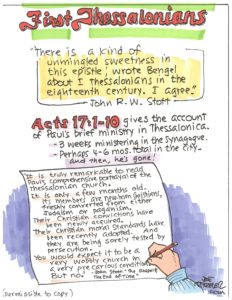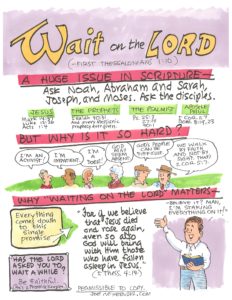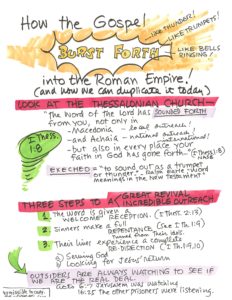Commended
1 Thessalonians 1:1–10
It’s great to see churches living out the gospel of the Lord Jesus Christ. Commending them is a delight.
But the Apostle Paul was concerned.
No church planter ever plans to leave a startup congregation only a few weeks into the project. Should that become necessary, the expectations of that fledgling ministry would be small. And yet this is exactly what had happened with the Thessalonian church.
Partnership (1)
Acts 17:1–10 tells of the birth of the church at Thessalonica and its abrupt abandonment as Paul and Silas were whisked out of town just ahead of the “posse.” Some weeks later, when they had begun ministering in Greece, Paul sent Timothy back to check on the little congregation, clearly dreading what might be found.
It’s important to keep in mind that this infant church could have gone either way.
 Consider first that it was only a few months old. Acts 17 mentions only three weeks Paul spoke in the synagogue, but clearly he spent several months in the city before having to leave suddenly.
Consider first that it was only a few months old. Acts 17 mentions only three weeks Paul spoke in the synagogue, but clearly he spent several months in the city before having to leave suddenly.
Second, the members were all new believers, straight from Judaism or paganism. Their Christian convictions and moral standards were recent.
Finally, two difficult things had occurred: Paul and Silas were forced to flee for their lives, and the church was being persecuted (also 2:14). Either of those could have doomed many a fledgling congregation.
With all those forces working against it, “ … you would expect it to be a very wobbly church in a very precarious position. But no,” writes John Stott in his book “The Gospel and the End of Time.”
Evidence (2–5a)
The news was all good. Paul was thrilled because Timothy’s report convinced him the Christians at Thessalonica were the “real deal.” Three things in particular stood out.
First, their faith worked. They were being productive for Christ. “Faith without works is dead” and “I will show you my faith by my works” (James 2:17–18). When four men went to extraordinary lengths to get a friend to Jesus, our Lord “saw their faith” (Mark 2:5). He sees ours.
Influence (5b–8)
Second, their faith was being spread in every direction. Their love produced. This love — which our Lord called the “badge” of believers (John 13:34–35) — was strong and active. “If you love Me, keep My commandments,” said our Lord throughout John 14–15. Love without works is just so much talk (1 John 3:18). Their love was the talk of the town.
Purpose (9–10)
Third, their hope was strong and steady. They had their eyes — their hopes — on the Lord Jesus’ return from heaven. Persecution will do that for you! “This hope we have as an anchor for our souls” (Heb. 6:19). 1 Peter 1:3 describes ours as “a living hope through the resurrection of Jesus Christ from the dead.” Their hope sustained them through difficult times and steadied their ministry for Christ.
Note that faith, love and hope are often found together in Paul’s epistles (see 1 Cor. 13:13).
It was clear, Paul concluded, that the Thessalonians were “beloved and chosen” by God. I suspect most of us have zero trouble believing we are loved by God — His love is the single greatest reality in this massive universe — but many struggle with the concept of being chosen. I suggest we keep in mind what our Lord said: “You did not choose Me, but I chose you” (John 15:16). The initiative is all on His side.
In a similar way, those of us with adopted children — my wife and I have three — delight in assuring them and other offspring that they are chosen and well-loved. Knowing we are special to the Lord keeps us from obsessing over shallow questions such as, “Does He love me today?” or “Have I lost my salvation?” God is faithful.
As these believers proved to be the genuine article — beloved and chosen of God, with works of faith, labors of love and steadfastness of hope — the gospel of Jesus Christ went forth in every direction.
(Note: See accompanying mini-posters at the online edition of TAB. Permission is granted to reproduce for a class or church.)
By Joe McKeever
Pastor, writer and cartoonist from Ridgeland, Mississippi





